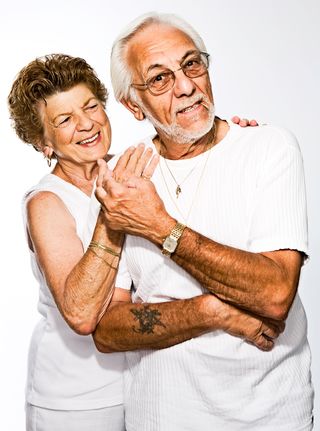Coronavirus Disease 2019
COVID-19 Anxiety: When Older Adults Insist on Breaking Bad
What to do when your parents need a time-out.
Posted April 2, 2020

"Can you spank my dad for me?" was the salty email subject line from James, who sought my advice to deal with his parents' lack of responsibility regarding the coronavirus safety measures.
Included in his text:
“My mom recently sent photos of her and her friends golfing, and socializing over dinner and drinks, with the caption, ‘Living my best life, lol.’ My dad is worse, goes to the grocery store daily to fraternize… he doesn’t wear protective gear, and views my concerns as intrusive. Please help me to help them so I don’t die of a heart attack.”
Here is my reply to James and to the legion of others rightly concerned over Mom and Dad's lack of coronavirus concern.
First, remember that later age can be a depressing stage of life: Bodies are broken, physical pain may be a daily occurrence, spouses, partners, and friends are dying, lost hopes and dreams are mourned, and mortality is looming. COVID-19 exacerbates all of these realities.
Their lack of caution could be a sign of depression. Seniors may feel robbed of their golden time as cruises and other travel plans are halted for the time being. Not spending time with grandchildren or dining out with peers are disruptions to an already restricted reality.
Be that as it may, older adults and younger adults are the most at risk due to their fragile immune systems, according to experts.
"I didn't get to 78 by being stupid."
Not to excuse the behavior, but to provide more context. Know that what someone says they do may be different than what they actually do. For example, it could be that James and his parents share a dynamic whereby they ignore his pleas due to an unresolved issue from the past. Also, they may like the attention, even though they complain and dismiss his concerns. Adults and their parents have complicated relationships as there's a lot of history to be sorted. It could be that James's sister recounts a different version of events when talking to her folks, and they may share that they are starting to practice precautions.
This much is true: We all come to our truth in our own time. You cannot reason anyone into changing if they're not ready. And denial is a powerful coping mechanism to deal with stress and anxiety, albeit an unhealthy one.
The following suggestions could be helpful for dealing with parents who don't follow COVID-19 health and safety guidelines:
1. Stay connected. Maybe this means you don't bring up the pandemic and follow their lead instead. Perhaps a conversation will unfold organically whereby they share they are concerned about their health and safety, after all. Maybe have the grandchildren call and express their concern, which may be better received, anyway.
2. Share family pictures (digitally or via mail). Remind your folks about how much you appreciate what they did for you growing up and the fun times you've experienced. Make intentional efforts to weave humor and gratitude into your conversations.
3. Make future plans. Caveat: we don't know what the future entails. Regardless, scheduled events have a way of lifting our moods and giving us something to look forward to. Envisioning a future can be a motivating factor in people taking better care of themselves.
4. Trust that your parents will step into reality. Facts, figures, and powerful images (as traumatic as they may be) are hard to ignore. Even if they don't change, there's a good chance their golfing buddies and happy-hour partners in crime will heed caution, thereby limiting their ability to socialize.
Most importantly, take care of yourself. We can only do so much when others don't follow the shelter-in-place and social distancing guidelines. Parenting your parents is a role-reversal with unique challenges. One can hope that as this pandemic continues to change course and affect our daily lives, at the very least, older adults will become impacted by the plight of our first responders. If not, you may need to put them in a time-out until they learn their lesson.


